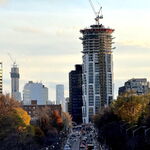From the Star
http://www.thestar.com/news/canada/...re-seats-in-house-of-commons-for-ontario?bn=1
Feds confirm more seats in House of Commons for Ontario
Published 1 hour 7 minutes agoEmail Print(0) Rss ArticleComments (0)
The Conservatives have announced that Ontario will get 15 additional seats in the House of Commons, with Alberta getting six more, B.C. getting six more, and three more for Quebec.
Adrian Wyld/THE CANADIAN PRESS
The Canadian Press
BRAMPTON, ONT.—Several provinces are getting more seats in the House of Commons to reflect population growth.
The Conservative government said Thursday that it will introduce legislation which will give 15 additional seats to Ontario, six more to British Columbia, six to Alberta and three to Quebec.
The bill “will achieve better representation for faster-growing provinces while maintaining representation for smaller and slower-growing provinces,†said Tim Uppal, minister of state for democratic reform.
Uppal made the announcement in Brampton, Ont., following weeks of speculation over how many additional seats each province would receive.
Both Ontario and Quebec had been expecting more seats in the expanded House of Commons.
Reports earlier this month suggested Ontario would increase its presence in the Commons by 13 seats, bringing its total to 119 instead of its current 106 seats.
While Thursday’s legislation announcement promises more seats than some expected, it nonetheless falls short of the 18 spots Ontario was slated to receive under previous legislation that died when Parliament was dissolved.
The previous bill, which was introduced last spring, would have also given seven seats to British Columbia and five for Alberta.
Meanwhile, Quebec wants a guarantee that it will continue to hold 24 per cent of the chamber’s seats. It currently has 75 of the 308 seats.
Uppal said the government wants to ensure population growth is factored in accurately when allocating seats.
Normally, the seating in the House of Commons is adjusted after each census using a complex formula adopted in 1985, but the Conservatives have said that formula penalized some regions




